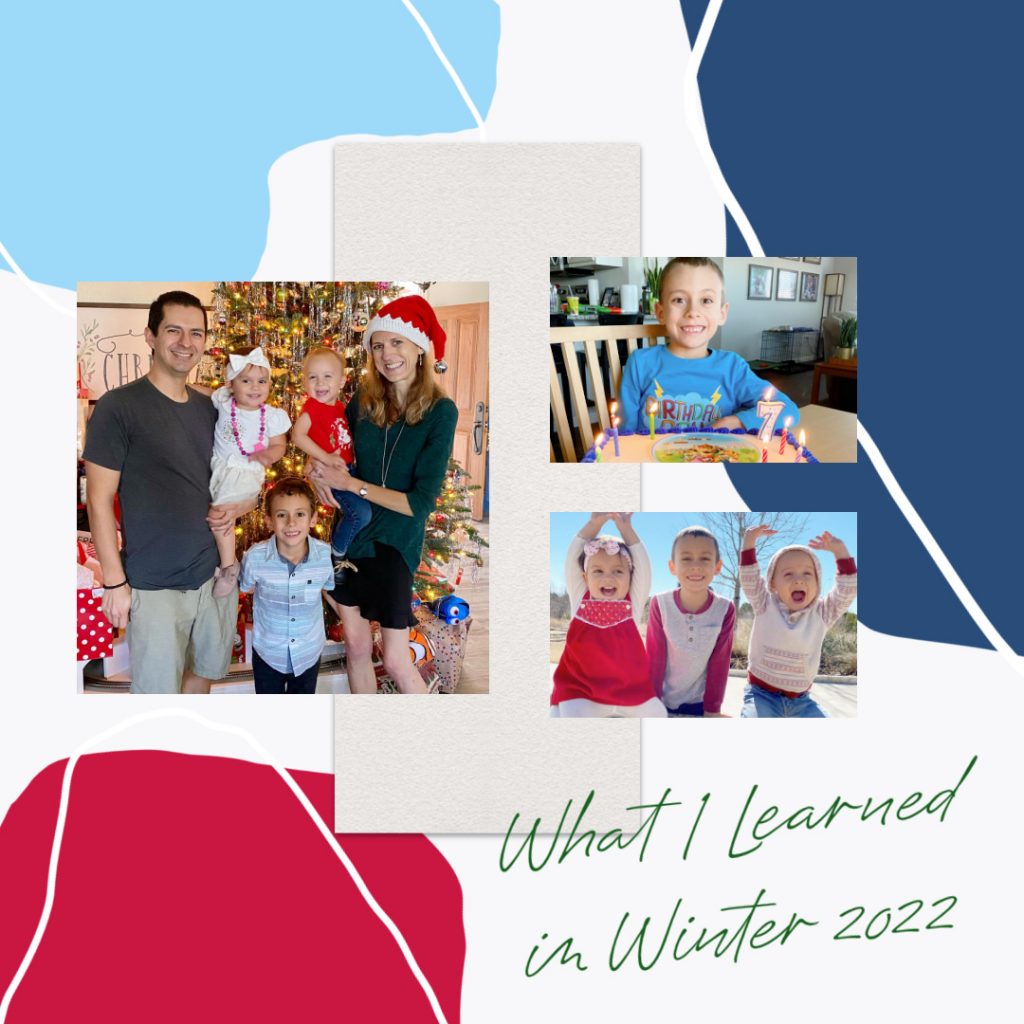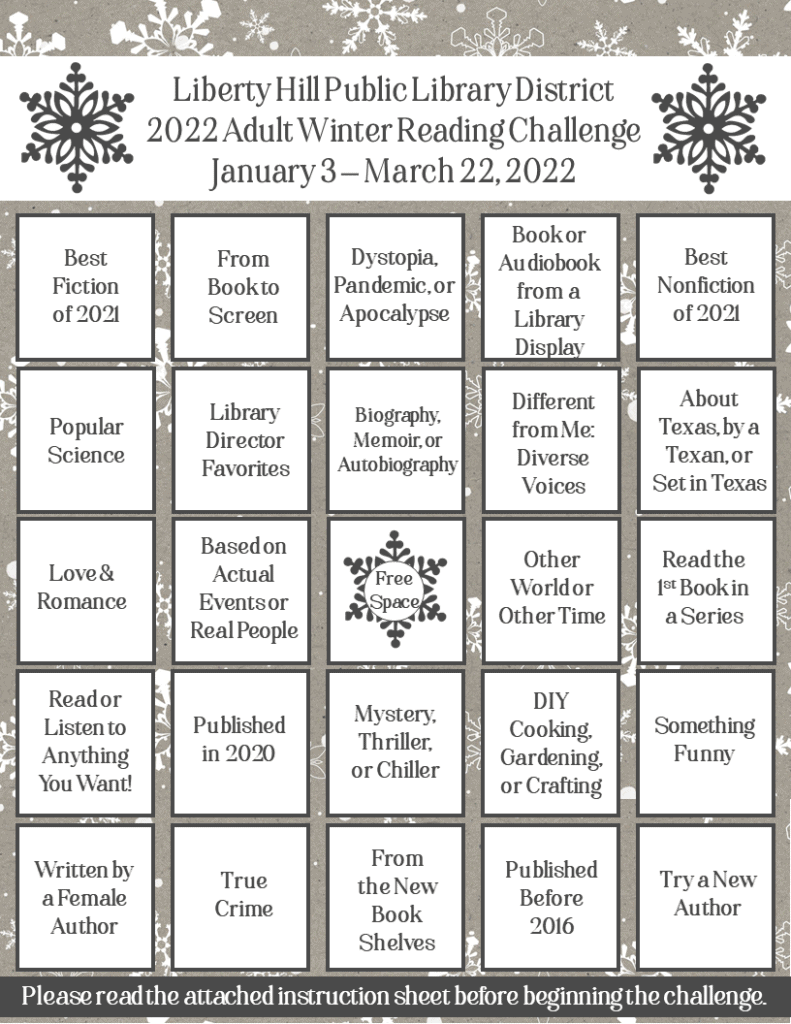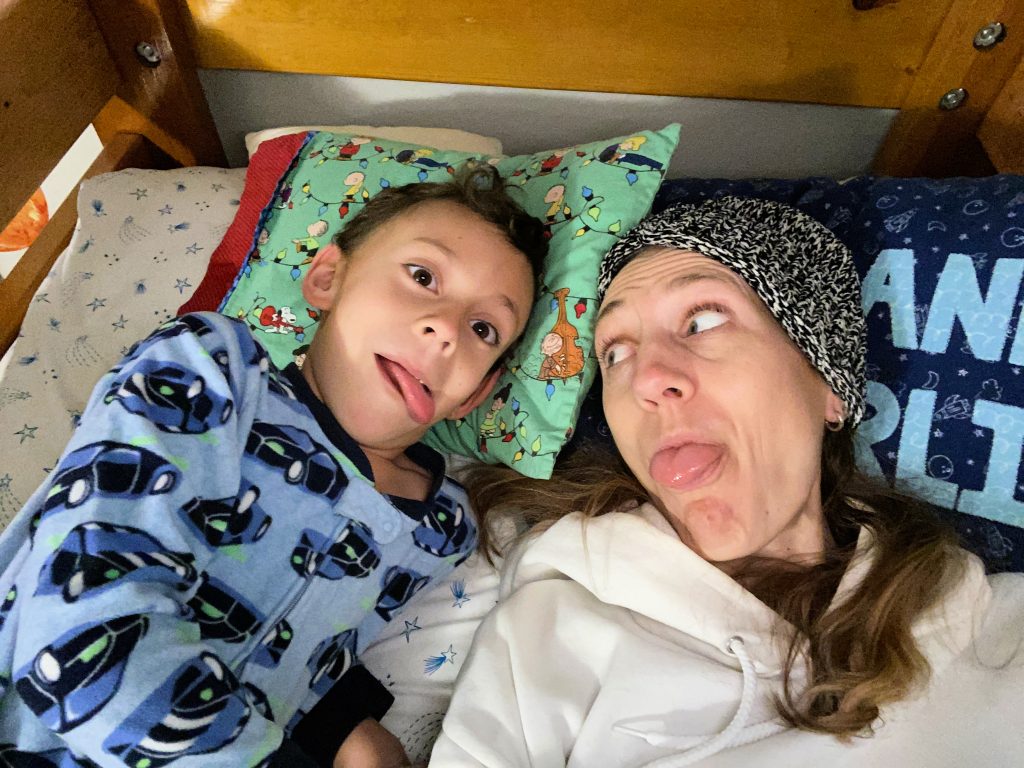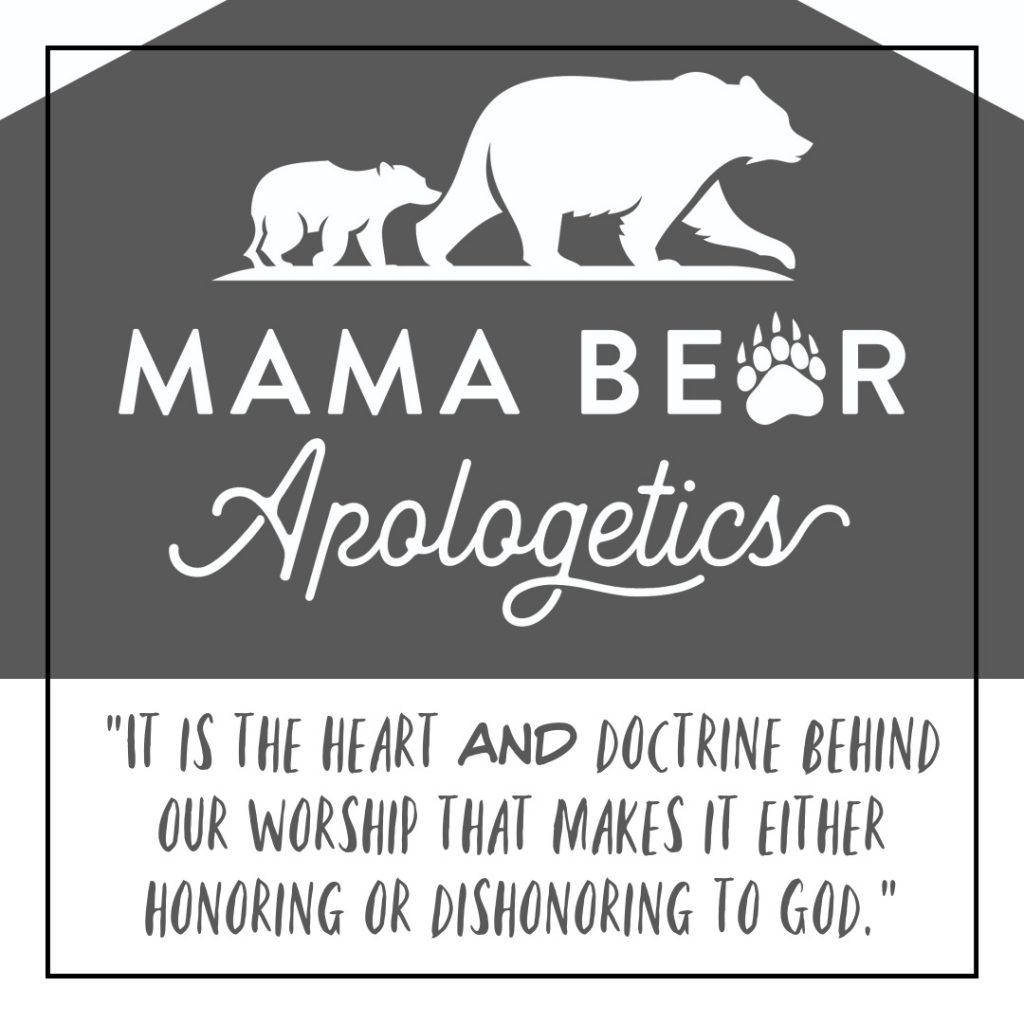The beginning of March is just days away, and spring is chomping at the bit to make its appearance. It was a mild winter (here in Central Texas, and in my own soul), but I am still eager for the advent of spring.
Over the past couple of years I’ve adopted the practice of reflecting on what I have learned at the conclusion of each season. As I approached the end of this winter, I noticed some internal resistance to compiling this list. I am generally quite amenable to retrospection and self-examination, so this hesitancy was new. After leaning into the resistance, I was able to uncover the sticking point (more on that below) and arrive at the breakthrough I needed to push forward in reflecting on some things I learned this winter.

A Few Things I Learned About Myself
Learning does not need to look a certain way to “count” as REAL learning. Writing (and specifically blogging) is my primary method for processing ideas. It is a helpful outlet, but I am beginning to see how, for a long time, it has been my only outlet—or at least the only outlet I felt counted. I realized this when sitting down to compile this winter WIL list and observed some internal hesitancy: underneath this resistance was an unnamed belief that I needed to document/record EVERY thing I learned this winter, and the task felt daunting. Once I set aside these self-imposed expectations, I was able to zoom in from the broader list of WHAT I LEARNED to the particulars of what I learned and was willing to share. I am giving myself permission to hold some of this season’s lessons back, at least for now—partly out of discretion, and partly because I just don’t feel like spilling all the tea. Even though not every one of this season’s lessons or takeaways can be found on this list, it does not mean those reserved lessons did not occur. Some are recorded in my personal journals, others have been shared with close friends, and there are a few lessons that remain between me and God. All of this learning “counts.” I may be a student of life, but THIS public list is not a test.
I need community. Over the last several months I have moved from a season of isolation to one of heavy social engagement. I am investing in groups and relationships, making an effort to talk to strangers, and pushing myself to get out of my bubbles for the sake of community. In vacating my Introvert comfort zone, I am beginning to recognize how crucial (and even FUN) relationships can be. I am not ready to turn in my Introvert Card just yet, but I am no longer opposed to posing as an Extrovert every once in a while.
I can change. Becoming more social. Evolving into a morning person. Growing in my tolerance to snow, rain, and colder weather. Acquiring a preference for silence over digital noise. These are just some of the shifts I have seen in myself over the past year. There have been deeper changes, too, related to character and heart matters. Seeing that I am capable of change in the more superficial areas of life gives me courage to adopt the harder changes ahead of me as I pursue further physical, emotional, and spiritual health.
It’s okay to be okay. And it’s okay to NOT be okay. Mental health can be so tricky, made even more challenging by the mind games I play regarding how I should or should not feel. I ended 2021 on an emotional high, and while it felt great to be feeling so good, there was also some guilt—as though I hadn’t “earned” the joy and peace I felt, particularly in light of so much suffering going on around me. Then, as the new year unfolded, I experienced something of the opposite: I had a few “off” days and felt guilty for no longer riding that end-of-year high. Through these ups and downs, I am working to accept that both good and bad days have their place. My emotions do not adhere to “shoulds,” and there is no benefit in feeling guilty because I am happier or sadder than I think I should be. The good days won’t last forever; neither will the harder ones. None of this is wrong, it just is, and the quicker I can accept this, the sooner I will be on my way to actually experiencing life (the good and the bad) as opposed to overthinking it.
Reading challenges might not be what’s best for my reading life. As one of my reading goals for 2022, I participated in our library’s Winter Reading Challenge. I managed to achieve my goal of getting a Bingo Blackout (you can see the challenge below), and while many of the categories did serve to expand my reading horizons (I’m looking at you True Crime and Dystopia), I did not necessarily enjoy the books I read to check off certain categories. I don’t regret reading these books, but feel my reading time could have been better spent elsewhere. I won’t rule out reading challenges in the future, and I see the benefit for people truly looking to break out of a reading rut. But as a fairly self-aware reader in tune with my preferences and capable of picking books that are right for me, I don’t know that I needed the nudges this challenge provided. I am more of a mood reader than I had realized, and I like to have more freedom and less obligation in this one area of my life.

What I Learned About Life, Parenting, and “Everyone Else”
Small shifts make all the difference. We have made a few small changes to our routines this season that have transformed attitudes and rhythms for our family. I am getting up ninety minutes earlier so that I can spend time with God before the kids get up and so that Charleston and I can finish the bulk of our school day prior to breakfast, and our days are infinitely smoother because of these shifts. Other changes that have had huge impact: adopting a different math curriculum, implementing thirty minutes of silent reading time for Charleston each afternoon, shifting my laundry days away from the weekend, and updating my computer to a newer operating system.
Things need to be named. I had not realized how many “things” (concepts, ideas, places, rituals, objects) in my own world did not have a name until I began trying to discuss these “things” with my children. For instance, we might run into several miscommunications regarding our Thursday morning Bible Study (is it church? Why isn’t it the same church we go to on Sunday? How are they both church? And why do the kids come to this Bible study, but not the Wednesday night one when they stay home with Grandma and Grandpa?)—all of which could have been avoided if I simply used its proper name (Hill Country Bible Women’s Study). I avoid giving names to things because I’m too lazy to come up with them, or fail to use given names with my kids because I worry they will be too long or confusing. In practice, it’s the lack of a name that is confusing. My kids (ALL kids) are concrete thinkers, and it’s helpful for me to use concrete verbiage as we navigate this world together. As I write this about my children, it has me wondering how many “things” in my own life are going unmanaged or undernoticed because they are missing names.
Things need a proper place. Along this theme of “kids being concrete thinkers,” their possessions need very specific homes if I expect them to be cleaned up. I can’t just tell my kids to pick up their rooms; I need to tell them exactly where each item is to go. This is true for me, too; I have too many “homeless” possessions that are always moving around because they don’t have a designated spot. Our house looks tidy, but it is not organized to my satisfaction. Identifying homes for all of our items needs to be my starting point for getting our house in order.
People are really hurting. When I shared what I had learned in 2021, I was blown away by how many of you reached out with your own stories of a difficult year. So many readers and friends experienced (and in some instances are still experiencing) deep emotional pain this past year, and too many are suffering alone. My heart aches over this; I wish my experience was an anomaly and that others could not relate to my depression. However, I am honored to have provided some hope and encouragement by sharing my own experience of healing. The feedback I received from that post affirmed the value of sharing our stories: what remains hidden cannot be healed, and we need each other for inspiration, encouragement, and solidarity in both the suffering and the moving on.
I am modeling for my children how to think about/treat me. As Charleston has gotten older (and sassier), he has begun voicing some opinions about me that hurt. The reason they sting is because I see the truth in his criticisms; and in fact, he likely believes these things about me because he notices that I believe them about myself. When I don’t present myself as a mom deserving of respect and obedience, I am essentially giving him (and the twins) a free pass to disrespect and rebel. Confidence in parenthood is not something that comes naturally to me, and presenting a decisive, confident front can feel disingenuous. But I can’t remain passive for fear of seeming hypocritical. My children need a mom they can trust, a mom who is strong and who will protect them through healthy boundaries and unwavering decisions. Of course there are times when they will require a mom who is a little softer, who leans more heavily into mercy and compromise; but my tendency is to swing too far the other way, and it’s time for me to toughen up (or at least give them the impression that I’m tough). Not only does this create a safe space for them with me, but it models healthy confidence and self-respect for them as they grow into adults and parents themselves.

Some Book & Podcast Takeaways I Jotted Down
(That I’ve Already Written About, or Will Likely Explore Further in Future Blog Posts)
From Bible in a Year Podcast (About Genesis 3-4, in which Adam and Eve are tempted by the serpent who challenges God’s trustworthiness): We wonder why God doesn’t show himself to us so that we can come to deeper belief in Him. But God doesn’t simply want us to believe in Him, that’s not the point; the point is to belong to Him. He could fully reveal His existence, but we would still need to decide whether or not to belong to and obey Him.
From Bible in a Year Podcast: Job’s friends thought he needed their answers, but he just needed their presence. We seek answers from God but He offers what we need, His presence. (I wrote about this here.)
From That Sounds Fun Podcast (In a discussion of whether or not to fast during Lent): We shouldn’t let our worries about improper motives prevent us from adopting the right practices. God can use our obedience, even when done from a less-than-altruistic place.
From Mama Bear Apologetics: Worship without sound doctrine is idolatry: it is like inventing a god and deciding to worship that instead of worshipping the one true God. This is why it is crucial for us to have true, Biblical understanding about God if we hope to pursue genuine, wholehearted faith and worship. And it’s why we need to instill proper Biblical understanding in our kids!

How are you feeling about doing a little reflection this season? If you’re up for it, I am eager to hear what you learned this winter. Leave me a comment or respond to this email to share!